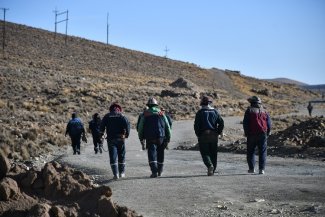ThyssenKrupp apprentices in Duisburg, North Rhine-Westphalia carry a wooden steel girder with the word ‘Future’ written on it as part of a series of nationwide, IG Metall just transition rallies on 29 October 2021.
In 2021, we argued that the core elements of any conceptualisation of a just transition is already well-rooted in international human rights law. We contended that a just transition should not be considered merely as an abstract public policy concept but rather as a human right. Since that time, there have been major legal and policy developments forging momentum towards a standalone human right to a just transition.
On 31 December 2021, the Inter-American Commission on Human Rights issued Resolution No. 3/2021 Climate Emergency: Scope of Inter-American Human Rights Obligations. The Resolution notes a ‘right to work’ and, at paragraph 50, the responsibility of states to ensure respect for trade union rights and to ensure that social protection systems are adapted to respond to climate change. Earlier this year, the governments of Chile and Colombia requested the Inter-American Court to issue an advisory opinion to “clarify the scope of State obligations, in their individual and collective dimension, to respond to the climate emergency within the framework of international human rights law”.
In July 2022, the UN General Assembly (UNGA) passed a resolution recognising the right to a clean, healthy, and sustainable environment as a human right. The resolution affirmed the linkage between climate change and human rights and underscored the obligation of states “to respect, protect and promote human rights, including in all actions undertaken to address environmental challenges”.
As the International Labour Organization (ILO) explained, this means “applying a ‘just transition’ logic which avoids trade-offs between the human right to work and the human right to a healthy environment; and protect biodiversity by supporting indigenous peoples’ livelihoods”.
In September 2022, the UN Human Rights Committee also issued a major decision on climate change and human rights under the International Covenant on Civil and Political Rights. The Committee found that Australia’s failure to adequately protect Indigenous Torres Islanders against the adverse impacts of climate change violated several of their rights under the Covenant.
Also this March, the UNGA adopted the Vanuatu-led resolution for an Opinion from the International Court of Justice on state responsibilities to protect future generations from climate change.
With these and other developments highlighted in our original piece, we explore opportunities to firmly embed just transition within existing international human rights law with a view to developing a standalone right.
We focus here on the right to work in the context of the climate crisis.
Utilising ILO Conventions
This June, government, worker, and employer delegates from around the world will meet at the International Labour Conference in Geneva to discuss how to achieve “a just transition towards environmentally sustainable economies and societies for all”. This discussion must look at the distinct role of the ILO in developing and implementing mitigation and adaptation measures within a rights-based context, and in particular the right to work.
The Employment Policy Convention (No. 122), adopted in 1964 – well before global awareness of a climate crisis – already forms an important foundation for ILO action, as it calls for a coordinated approach to economic and social policies “to promote full, productive and freely chosen employment”. In the context of a just transition, this would require states to adopt a coordinated set of policies to ensure access to employment opportunities and active labour market policies to support transition away from those industries contributing to the crisis.
The Employment Promotion and Protection against Unemployment Convention (No. 168) well supplements Convention 122, as it obligates states to “ensure that its system of protection against unemployment…contribute to the promotion of full, productive and freely chosen employment”. Having adequate social protection systems will be crucial to supporting workers and their families and communities, as even the measures to adapt to and mitigate climate change will be disruptive. Ensuring that workers, especially the most vulnerable, are supported through the transition will be necessary to ensure support for these measures. And of course, the development of all such measures must be undertaken in negotiation with workers and their organisations.
The ILO supervisory system, and the Committee of Experts on the Application of Conventions and Recommendations in particular, can help to develop the law through observations in relation to Conventions 122 and 168, and workers organisations should raise these issues with them. Also useful would be a concrete section on just transition in the next General Survey on employment policy, building off the 2015 ILO Guidelines on a Just Transition.
Putting Article 6 of the ICESCR to good use
Article 6 of the International Covenant on Economic, Social and Cultural Rights (ICESCR) protects a right to work. However, the latest General Comment on it was from 17 years ago and could be further elaborated in the context of the climate crisis. Nevertheless, the current General Comment does provide useful guidance for the present moment, as it recognises, drawing from ILO Convention 168, that the “right to work contributes at the same time to the survival of the individual and to that of his/her family, and insofar as work is freely chosen or accepted, to his/her development and recognition within the community”. Further, the General Comment explains, citing Convention 122, that the right to work “affirms the obligation of State parties to assure individuals their right to freely chosen or accepted work, including the right not to be deprived of work unfairly. This definition underlines the fact that respect for the individual and their dignity is expressed through the freedom of the individual regarding the choice to work, while emphasizing the importance of work for personal development as well as for social and economic inclusion”.
As explained by the former High Commissioner for Human Rights, a just transition is one which gives full effect to Article 6, so that in the transformation of the world of work, sustainable and inclusive economies are built on the basis of international human rights. This includes state measures to protect the environment while investing in not only clean and renewable energy, but in a human infrastructure, such as significant investments in the care economy. And of course, this means affirmative measures to promote freedom of association and collective bargaining, and to eliminate precarious forms of employment (consistent with Article 7 on just and favourable conditions of work).
The right to work also cannot be guaranteed without social protection to minimise the impact of job losses and improving job opportunities. This also requires ensuring the protection of other human rights, such as the right to food, health, housing, and education.
The Committee on Economic, Social and Cultural Rights (CESCR), the body responsible for monitoring implementation of the ICESCR, should therefore explicitly recognise just transition within the context of the right to work in its next general comment on Article 6. Further, the CESCR’s general comment due this year will be on Sustainable Development and Covenant rights. We would argue that any consideration of ICESCR rights in the context of sustainable development must include just transition measures.
Action on the Human Rights Council and UN General Assembly
Situating a right to a just transition in the ICESCR would provide the necessary momentum and legal precedent to develop a standalone right via a resolution of the UN Human Rights Council. While HRC resolutions are non-binding on states, taken together with the ILO and ICESCR just transition jurisprudence we’ve called for here, a global political commitment of this magnitude would also propel the effective implementation of this critical right. Indeed, action at the HRC level could also lead to a more expansive UN General Assembly resolution on a human right to a just transition.
A human rights-based approach to climate action is imperative to ensure a just transition for workers and communities. In order to effectively mobilise resources to enable a transition to low-carbon climate resilient societies, just transition needs to be a recognised as a human right. As we’ve argued here, the ILO, UN treaty bodies and the United Nations system have a major opportunity to make this a reality. UN special rapporteurs, regional human rights bodies and civil society organisations, including trade unions, will also need to unite around this ambitious goal.














